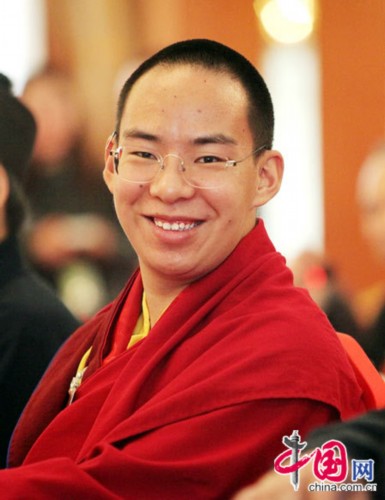Bainqen Erdini Qoigyijabu
|
|
|
The 11th Panchen Lama, Bainqen Erdini Qoigyijabu |
The 11th Panchen Lama, Bainqen Erdini Qoigyijabu, on Tuesday talked to Xinhua reporters Cui Jing and Xiong Zhengyan about his obligations as both a spiritual leader and a member of the nation's top advisory body, the National Committee of the Chinese People's Political Consultative Conference (CPPCC), which is now in session.
The 21-year-old Panchen Lama, one of the two most senior living Buddhas in Tibetan Buddhism, is also vice president of the Buddhist Association of China.
The followings are the excerpts of the interview:
Q: How do you view your identity and obligation as a political advisor?
A: I have known more about the sacred obligation of being a political advisor after one year of being in the job. That is to come up with tactics and strategies for the nation with my ability and gifts.
I am a CPPCC National Committee member from the religious sector. And in the sector, members have various faiths, including Islam, Taoism, Catholicism, Protestantism and Buddhism. These members come from different regions and speak different dialects, but they all speak for the nation and its people.
Q: How you do arrange your study and life during the CPPCC and NPC (National People's Congress) sessions?
A: I still study and recite scriptures during the two sessions. It's a daily assignment. I spend a proper amount of time on study, on the condition that it does not interfere with my attendance to the conference.
Q: In its work report this year, the government pledges to increase support for the development of Tibet and other regions inhabited by ethnic minority groups. What's your opinions on that?
A: Premier Wen's report was very comprehensive. To people in the religious circle and religious believers at large, the most relevant part is on his call for religious leaders and believers to "play an active role in facilitating economic development and social harmony."
The centerpiece of Buddhist teachings is to advocate compassion and salvation of all living beings. How to manifest this decree? It is to let religion play an active role in our country's economic and social development.
I feel that Tibetan Buddhism has entered the best phase as well as the most crucial phase in its history. There is only one way for the Tibetan Buddhism, which has undergone ups and downs through the ages, to pass on and thrive: to play a part in the 21st century by promoting national prosperity, people's well-being, and social harmony and stability. It's impossible for a culture to be passed on if it does not have a positive effect on the society. This applies to Tibetan Buddhism too.
Q: How about the current inheritance of Tibetan Buddhism in Tibet?
A: Tibetan Buddhism should maintain the religious tradition we have long followed. Meanwhile, we should also adapt to social changes and interpret doctrines and canons of Tibetan Buddhism abreast with the times.
Q: How do you see the changes in the 60 years after Tibet's peaceful liberation?
A: Tibet has gone through historic changes since the People's Liberation Army came to Tibet and liberated the region in a peaceful way in 1951. Since then, people's lives have seen changes beyond recognition.
The Tibetan people now enjoy religious freedom and are much better-off.
People can freely choose as they like to start a business, study or become a Buddhist monk. They are free to do whatever they aspire to, which was impossible in old Tibet. The peaceful liberation of Tibet has made people the real master of Tibet.
Q: As a representative in Tibetan Buddhism, what's your comment on government's administration of religious affairs in accordance with the law?
A: We live in a society governed by law, while the religious practices fall into the category of social activity, therefore only by administration according to law can we ensure a stable and harmonious development of the religious affairs, and it's also of great importance to promote the long-term and healthy development of all religions.
We should love our country, abide by the law, love our religion, follow the precepts, be self-disciplined, merciful, compassionate and altruistic, no matter what religion we follow.
 0
0 







